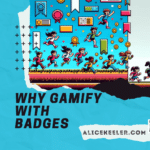Guest Post by Co-authors, Steve Isaacs & Jesse Lubinksy, The Esports Education Playbook: Empowering Every Learner Through Inclusive Gaming
The Power of Gaming & Esports
It’s hard to remember a time when video games weren’t a major part of our lives. Even going back to the early days of gaming when home consoles like Atari and Intellivision were first appearing in family living rooms and kids’ allowances were mostly spent pumping quarters into games at the local arcade, video games were almost always synonymous with recreation and fun but rarely, if ever, with learning. Even the word ‘game’ itself couldn’t possibly tie into meaningful teaching and learning outcomes in school, could it?
In recent years, esports, or competitive video gaming has become a dominant force around the globe capturing audiences unheard of even for some of the most popular sports in the world. Colleges and universities started to create esports teams and even began offering scholarships to some of the best players out there. This led to K-12 educators finding opportunities in their schools to create esports teams and/or clubs to empower and engage their students. But something fascinating happened along the way. Esports ceased being about the games but, instead, has become something even more incredibly powerful and inspiring.
The Need for Esports
Esports has become an outlet for many students who don’t otherwise have a strong home / school connection. Many students who are interested in games, like 겜블시티 가입코드, may not fall into other affinity groups like traditional athletics or other extracurricular activities. It is crucial to provide opportunities for those who otherwise don’t feel a part of the school community. The power of esports even goes so far beyond that. It provides every student with the opportunity to be part of a team regardless of their innate physical ability, their socioeconomic background, or their gender. And even further, students don’t have to even be good at video games to be a meaningful contributor to an esports club or team! There are literally dozens of roles from manager to broadcaster to content creator that a student could engage in that would not only allow them to be a valued member of the team but to develop skills that will help them well beyond their years in school.
Our book, The Esports Education Playbook: Empowering Every Learner Through Inclusive Gaming, is an ideal entry point for anyone interested in learning about the world of scholastic esports. The four co-authors (Steve Isaacs, Jesse Lubinsky, Christine Lion-Bailey and Chris Aviles) are career educators who each have extensive experience getting successful school and district-wide programs off the ground and understand the challenges, concerns, and potential pitfalls that you may encounter. To provide the most valuable resource for educators, we broke our book up into four sections, each one with a powerful set of tips and stories from educators and practitioners out in the field of esports.
- ‘The Why of Esports in Schools’ examines the many benefits that an esports program confers on participants through the lens of social and emotional learning (SEL). It both describes typical approaches and outcomes of SEL, and details what an SEL curriculum for esports should entail, cataloguing the overall benefits of esports for students.
- ‘Changing Perceptions about Esports’ lays out common objections to the formation of esports teams at public schools (such as excessive screen time, toxic gaming culture, and violence in gaming) and offers a range of responses that organizers can offer naysayers.
- ‘Working with Stakeholders’ explains how esports organizers should advocate for the sport when approaching stakeholders and offer a number of helpful talking points.
- ‘Designing an Esports Program’ describes best practices for setting up, managing, and running an esports program, with particular attention to differences between club and varsity teams.
Along with an inspiring foreword from James O’Hagan, an esports history lesson from Mike Washburn, and a glimpse into the future of scholastic esports with our friends from the North American Scholastic Esports Federation (NASEF), we think you’ll find that The Esports Education Playbook has something for everyone and is the perfect addition to your education library.
Launch Promotion
As a special launch promotion, we are running a LIMITED-TIME launch promotion where you will receive not one but TWO digital resource kits to help you launch and support your own esports program including starter and curriculum kits! For full details, check out the link here: http://bit.ly/esportsplaybookpromo
We believe that esports programs will prove to play an important role in how we meet our students where they are and provide them with the opportunities they want and need to succeed. Whether you are completely new to esports, looking to start your own program, seeking out ways to make your existing program even better, or just curious, this is the book for you. So even if you’ve never played a game before in your life, join us on a journey that may not only prove to change the lives of your students, but yours as well.
Chief Learning Officer, Ready Learner One
Teacher, Game Design and Development, Bernards Township Public Schools






